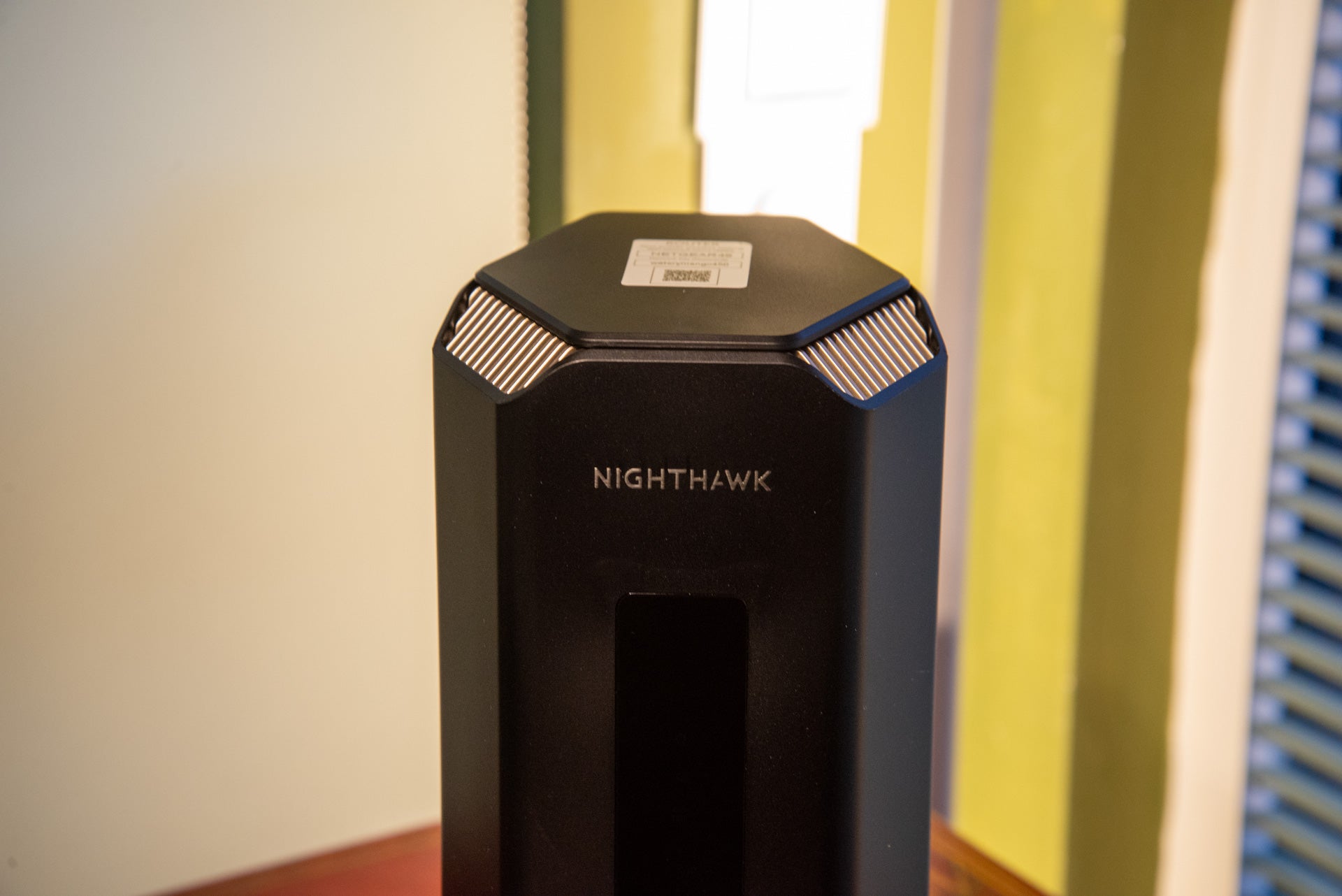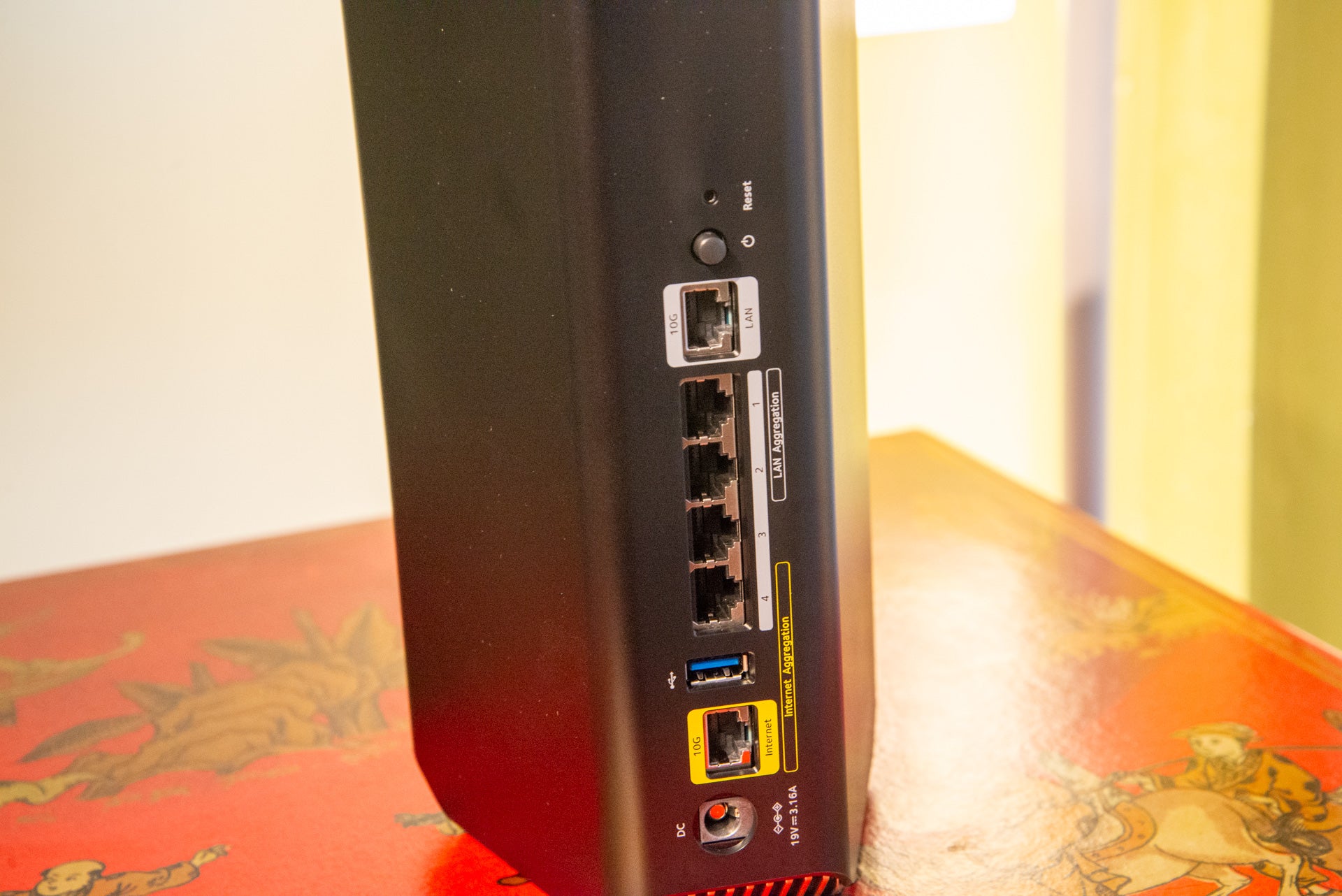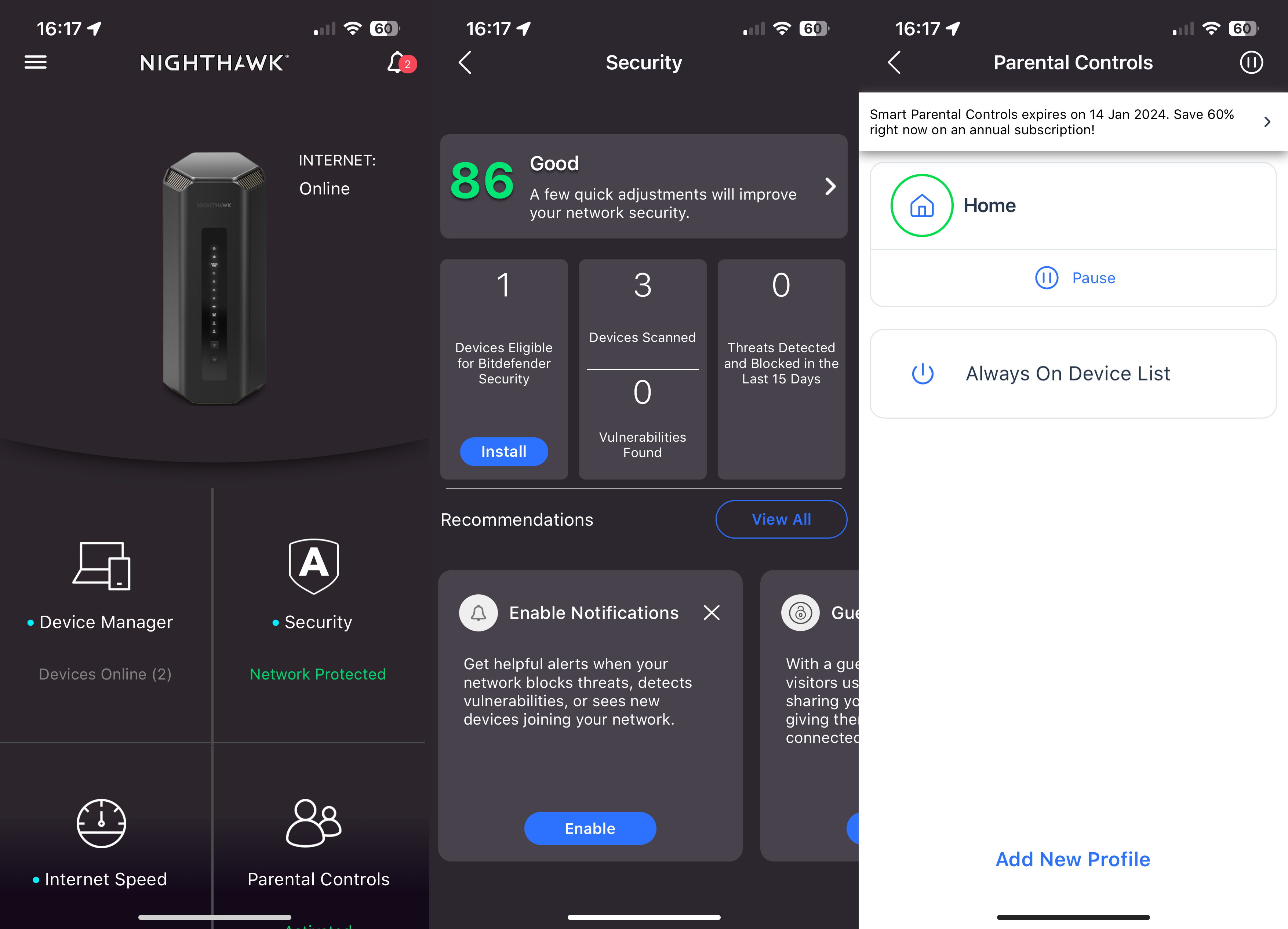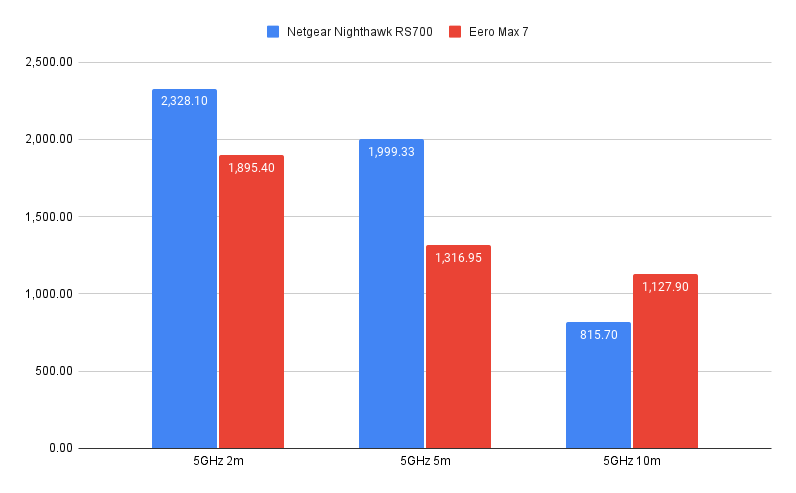Verdict
Demonstrating what Wi-Fi 7 is truly capable of, the Netgear Nighthawk RS700 delivered the fastest throughput speeds that we have ever seen. It’s good at medium range, too, making this router ideal for smaller homes that want the best speeds. Its high price and the limited number of Wi-Fi 7 devices mean that this is more suitable for early adopters.
Pros
- Exceptionally fast
- Useful app and services
- Good range of ports
-
Wi-Fi 7Offers throughputs on a single channel of up to 11.5Gbit/s. -
Ethernet portsFor home networking there are four Gigabit and one 10 Gigabit Ethernet ports, and there’s a 10 Gigabit Ethernet WAN port.
Introduction
Wi-Fi 7 is a giant leap forward in terms of performance, able to utilise multiple bands at once to deliver speeds that a year ago you’d have thought were impossible.
Netgear has got its first Wi-Fi 7 router, the tower-like Netgear Nighthawk RS700. I’ve spent a few weeks testing this new router, so here are my thoughts.
Design and features
- Tall design
- 10 Gigabit Ethernet
- Useful app
For smaller homes that don’t need to have a mesh system, the Netgear Nighthawk RS700 offers next-gen speeds today in a cheaper package. Well, I say cheaper, at £799.99/$699.99, this router is anything but cheap. However, it’s a lot cheaper than the £1149/$1699.99 that you’d pay for two Eero Max 7 satellites.
Externally, the Netgear Nighthawk RS700 is different to Netgear’s more recent routers, with the antennas kept on the inside of the tall, funky looking black tower.

Spin this around, and there’s the collection of Ethernet ports. There’s a 10 Gigabit Ethernet port for WAN connections, so you can use the fastest internet connections available in the UK today and have the capacity to take faster internet connections in the future.

There are then four Gigabit Ethernet ports at the back for standard devices, and an additional 10 Gigabit Ethernet port, which can be for one fast device or to hook into a 10 Gigabit Ethernet switch if you want to run a very fast wired network.
As with other Nighthawk devices, configuration of the router is best through the Nighthawk app. Functionally, it’s very similar to the Orbi app for Netgear’s mesh systems. The app will automatically detect the router and take you through configuring your internet connection and setting up a secure Wi-Fi network.
At its most basic, the app lets you know which devices are connected to the router and gives you remote control, so you can do things like reboot the router when you’re away from home.

Parental Controls lets you create profiles for each member of your home and assign their devices to them. This gives a quick way of pausing an internet connection. Upgrade to the Premium version of the product (£6.99 a month or £49.99 a year), and you get internet filtering and scheduling, plus access to the My Time app, which provides screen time control on mobile devices, even if they switch to use a mobile connection.
Netgear Armor is the security suite that monitors your network, blocking threats in real time. With a subscription (£84.99), you can install the Bitdefender Security software on your computers and mobile devices, giving protection outside of the network.
Depending on what you have in place, it’s nice to be able to layer on more advanced security and parental controls. Neither service is required, and the router will function normally without these services.
Switch to the web interface, and there’s even more control, including the option to set the channels used for the 2.4GHz, 5GHz and 6GHz networks. As this is a Wi-Fi 7 device, all three channels share the same network name, with the router automatically controlling how connecting devices work. For older devices, that means pushing them onto the best channel for their capabilities; for Wi-Fi 7 devices, it means allowing them to use multiple networks at the same time through Multi-Link Operation (MLO).
It’s a system that works reliably. With Wi-Fi 6E routers, I often had trouble getting my PC to connect to the 6GHz band. With the Netgear Nighthawk RS700, my PC always defaulted to this connection, giving it the fastest connection speed possible.
Performance
- Huge throughputs
- Good at medium range
- Speeds drop off at long range
So far, so normal, but what you’re probably most interested in is how fast this router is. The main specs are impressive: 4×4 2.4GHz (1.4Gbit/s), 4×4 5GHz (5.8Gbit/s thanks to 160MHz channels) and 4×4 6GHz (11.5Gbit/s thanks to 320MHz channels). That’s quite the powerhouse, and a way ahead of the Eero system. Overall, with 12 streams available, this single router can support a lot of devices at once.
Throughput is quite incredible when testing with a Wi-Fi 7 device using Open SpeedTest. At close range, I managed average throughputs of 2328.10Mbit/s, which is by far the fastest speeds I’ve ever seen from a Wi-Fi device, and faster than Gigabit Ethernet.
Moving to the first floor of my house, speeds remained high at 1999.33Mbit/s, which is faster than the Eero Max 7 achieved.
On the second floor, speeds were still impressive at 815.7Mbit/s, although this speed was a little below that of the Eero Max 7. At range, a mesh system truly shows its benefits and, for wider coverage, it’s worth getting a system like that rather than a single router.

Latest deals
Should you buy it?
You want incredible speeds
If you’ve got Wi-Fi 7 devices already (or are about to get some), then this router offers exceptional throughput speeds.
You want something cheaper
Anyway you cut it, this router is expensive, and you can get good speeds and reliable coverage with a cheaper Wi-Fi 6 router.
Final Thoughts
If you have a smaller property, such as a flat, and want incredible throughput speeds for the latest devices, and a future-proofed router, the Netgear Nighthawk RS700 is incredibly fast.
It is also very expensive, so those who want good speeds without the high price will find that a Wi-Fi 6 router from our list of the best routers will work.
How we test
Unlike other sites, we test every wireless router we review thoroughly over an extended period of time. We use industry standard tests to compare features properly. We’ll always tell you what we find. We never, ever, accept money to review a product.
Find out more about how we test in our ethics policy.
Used as our main wireless router for the review period
We throughput test all wireless devices using the same equipment in the same locations so that we have accurate comparisons
FAQs
Yes, it has optional subscriptions for parental controls and security.
Yes, you’ll see the best speeds using Wi-Fi 7 devices, but Wi-Fi 6 and older devices can still connect to the router.
Verdict
Demonstrating what Wi-Fi 7 is truly capable of, the Netgear Nighthawk RS700 delivered the fastest throughput speeds that we have ever seen. It’s good at medium range, too, making this router ideal for smaller homes that want the best speeds. Its high price and the limited number of Wi-Fi 7 devices mean that this is more suitable for early adopters.
Pros
- Exceptionally fast
- Useful app and services
- Good range of ports
-
Wi-Fi 7Offers throughputs on a single channel of up to 11.5Gbit/s. -
Ethernet portsFor home networking there are four Gigabit and one 10 Gigabit Ethernet ports, and there’s a 10 Gigabit Ethernet WAN port.
Introduction
Wi-Fi 7 is a giant leap forward in terms of performance, able to utilise multiple bands at once to deliver speeds that a year ago you’d have thought were impossible.
Netgear has got its first Wi-Fi 7 router, the tower-like Netgear Nighthawk RS700. I’ve spent a few weeks testing this new router, so here are my thoughts.
Design and features
- Tall design
- 10 Gigabit Ethernet
- Useful app
For smaller homes that don’t need to have a mesh system, the Netgear Nighthawk RS700 offers next-gen speeds today in a cheaper package. Well, I say cheaper, at £799.99/$699.99, this router is anything but cheap. However, it’s a lot cheaper than the £1149/$1699.99 that you’d pay for two Eero Max 7 satellites.
Externally, the Netgear Nighthawk RS700 is different to Netgear’s more recent routers, with the antennas kept on the inside of the tall, funky looking black tower.

Spin this around, and there’s the collection of Ethernet ports. There’s a 10 Gigabit Ethernet port for WAN connections, so you can use the fastest internet connections available in the UK today and have the capacity to take faster internet connections in the future.

There are then four Gigabit Ethernet ports at the back for standard devices, and an additional 10 Gigabit Ethernet port, which can be for one fast device or to hook into a 10 Gigabit Ethernet switch if you want to run a very fast wired network.
As with other Nighthawk devices, configuration of the router is best through the Nighthawk app. Functionally, it’s very similar to the Orbi app for Netgear’s mesh systems. The app will automatically detect the router and take you through configuring your internet connection and setting up a secure Wi-Fi network.
At its most basic, the app lets you know which devices are connected to the router and gives you remote control, so you can do things like reboot the router when you’re away from home.

Parental Controls lets you create profiles for each member of your home and assign their devices to them. This gives a quick way of pausing an internet connection. Upgrade to the Premium version of the product (£6.99 a month or £49.99 a year), and you get internet filtering and scheduling, plus access to the My Time app, which provides screen time control on mobile devices, even if they switch to use a mobile connection.
Netgear Armor is the security suite that monitors your network, blocking threats in real time. With a subscription (£84.99), you can install the Bitdefender Security software on your computers and mobile devices, giving protection outside of the network.
Depending on what you have in place, it’s nice to be able to layer on more advanced security and parental controls. Neither service is required, and the router will function normally without these services.
Switch to the web interface, and there’s even more control, including the option to set the channels used for the 2.4GHz, 5GHz and 6GHz networks. As this is a Wi-Fi 7 device, all three channels share the same network name, with the router automatically controlling how connecting devices work. For older devices, that means pushing them onto the best channel for their capabilities; for Wi-Fi 7 devices, it means allowing them to use multiple networks at the same time through Multi-Link Operation (MLO).
It’s a system that works reliably. With Wi-Fi 6E routers, I often had trouble getting my PC to connect to the 6GHz band. With the Netgear Nighthawk RS700, my PC always defaulted to this connection, giving it the fastest connection speed possible.
Performance
- Huge throughputs
- Good at medium range
- Speeds drop off at long range
So far, so normal, but what you’re probably most interested in is how fast this router is. The main specs are impressive: 4×4 2.4GHz (1.4Gbit/s), 4×4 5GHz (5.8Gbit/s thanks to 160MHz channels) and 4×4 6GHz (11.5Gbit/s thanks to 320MHz channels). That’s quite the powerhouse, and a way ahead of the Eero system. Overall, with 12 streams available, this single router can support a lot of devices at once.
Throughput is quite incredible when testing with a Wi-Fi 7 device using Open SpeedTest. At close range, I managed average throughputs of 2328.10Mbit/s, which is by far the fastest speeds I’ve ever seen from a Wi-Fi device, and faster than Gigabit Ethernet.
Moving to the first floor of my house, speeds remained high at 1999.33Mbit/s, which is faster than the Eero Max 7 achieved.
On the second floor, speeds were still impressive at 815.7Mbit/s, although this speed was a little below that of the Eero Max 7. At range, a mesh system truly shows its benefits and, for wider coverage, it’s worth getting a system like that rather than a single router.

Latest deals
Should you buy it?
You want incredible speeds
If you’ve got Wi-Fi 7 devices already (or are about to get some), then this router offers exceptional throughput speeds.
You want something cheaper
Anyway you cut it, this router is expensive, and you can get good speeds and reliable coverage with a cheaper Wi-Fi 6 router.
Final Thoughts
If you have a smaller property, such as a flat, and want incredible throughput speeds for the latest devices, and a future-proofed router, the Netgear Nighthawk RS700 is incredibly fast.
It is also very expensive, so those who want good speeds without the high price will find that a Wi-Fi 6 router from our list of the best routers will work.
How we test
Unlike other sites, we test every wireless router we review thoroughly over an extended period of time. We use industry standard tests to compare features properly. We’ll always tell you what we find. We never, ever, accept money to review a product.
Find out more about how we test in our ethics policy.
Used as our main wireless router for the review period
We throughput test all wireless devices using the same equipment in the same locations so that we have accurate comparisons
FAQs
Yes, it has optional subscriptions for parental controls and security.
Yes, you’ll see the best speeds using Wi-Fi 7 devices, but Wi-Fi 6 and older devices can still connect to the router.
























